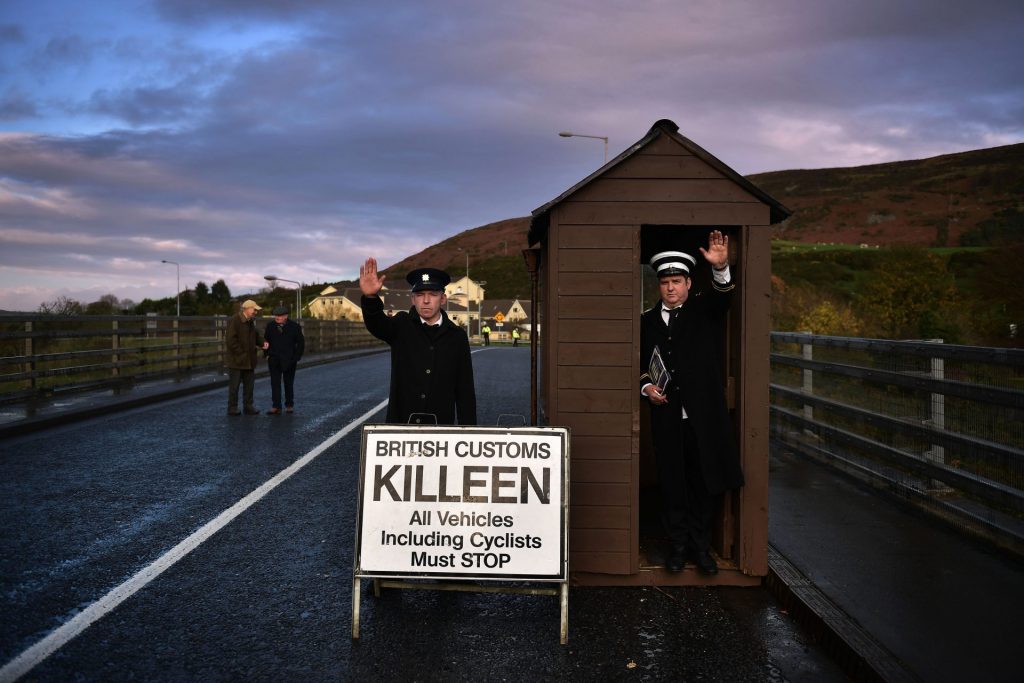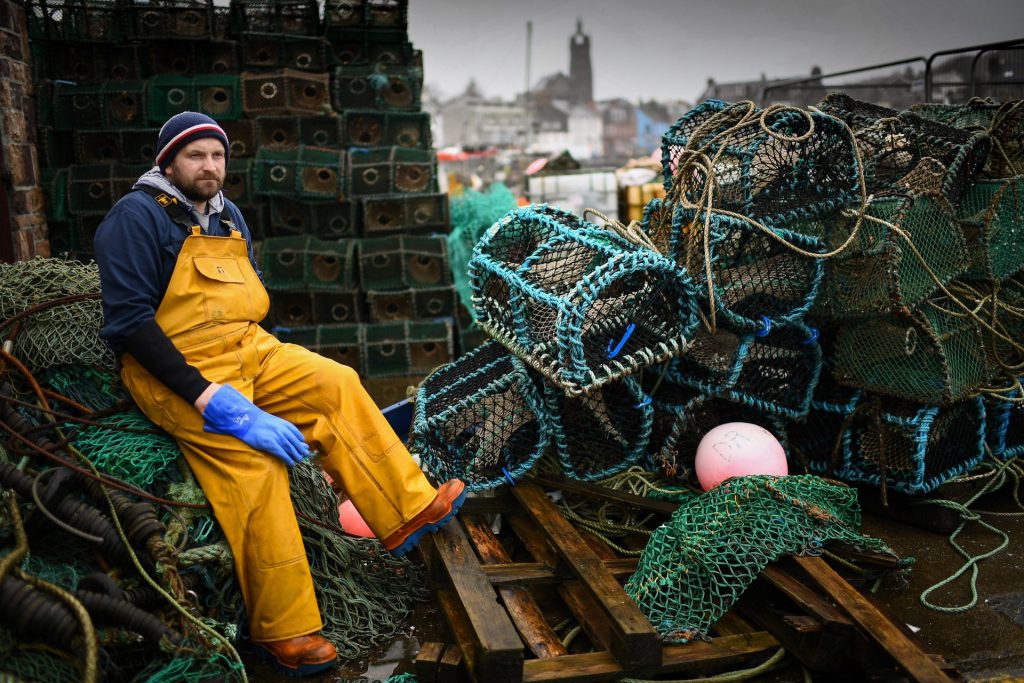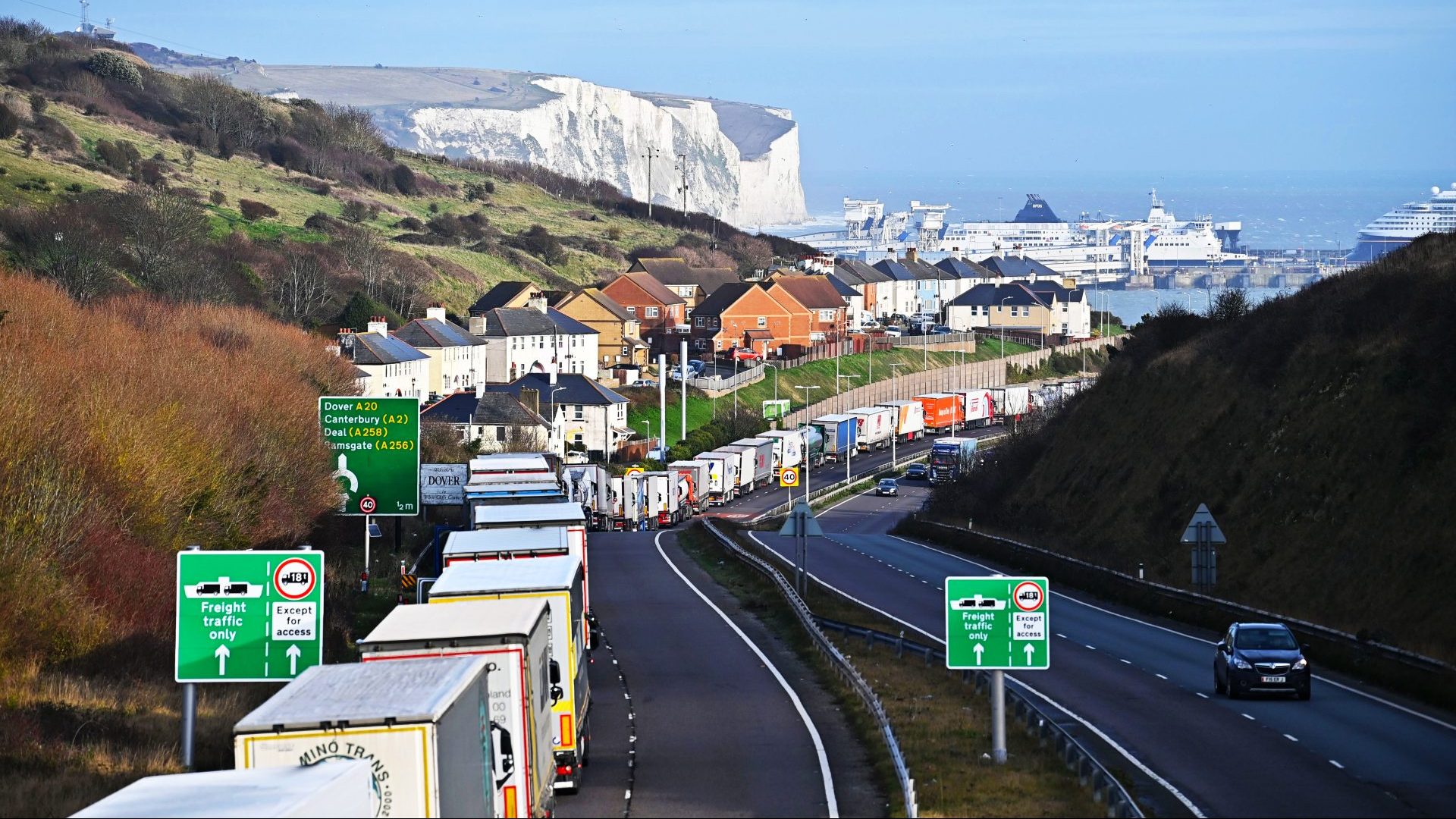They say the darkest hour is just before dawn. But when it’s a false dawn, perhaps the darkest hour is just after.
When the UK left the EU on January 31 2020, Boris Johnson hailed “the dawn of a new era”. More than two years later, the UK is depleted, disrespected and discredited. It is a cautionary tale; a nation adrift and bereft where every political principle has been sacrificed on the altar of Brexit expediency by a government trying to keep disingenuous promises made by people who never really understood what they were pledging. Or if they did, they had their fingers firmly crossed behind their backs.
Johnson has said he has got Brexit done. But six years after the referendum, the UK is on the brink of a bruising legal battle with Brussels, if not a full-blown trade war, while the economy is grinding to a halt as wages stagnate, prices spiral, farmers and fishers despair, and small businesses throw in the towel, defeated by reams of red tape.
The UK is still in thrall to a Brexit vision that was always unworkable in its hardest form and to a one-trick-pony prime minister, devoid of any policy other than saving his own skin and repeating the mantra that he got Brexit done. By refusing to acknowledge the truth – on Brexit and much else – Johnson has impaled himself on his own lie. He cannot address the manifold problems that still plague the country because to admit to these problems would be to admit that Brexit is not done or working. And so the naked emperor must continue to stride through the crowds, pretending not to hear the shocked gasps and cries of “shame”.
To repurpose the words of Johnson’s hero, Winston Churchill, Brexit is a riddle, wrapped in a mystery, inside an enigma. That was true when people voted on it in 2016, and it is true now. And while the Tories struggle to untangle this terrible triptych, the sun that rose in that new dawn Johnson heralded is climbing ever higher over a diminished UK, mercilessly lighting up the damage inflicted on towns and cities and farms and people. The damage done to the very definition of the UK.
Here are 10 promises made by Leave that have failed to produce the results they bragged about.
The Promise: We will control our own money
Three little words came to define the Brexit campaign: take back control. Punchy, proactive and usefully imprecise. But what has this mantra meant? Let’s start with money. The UK may certainly control its own money, but unfortunately there is far less of it because there is less growth, less trade and fewer tax revenues.
Those who support Brexit will say Covid is to blame, and indeed the pandemic is responsible for some of the slowdown. And the war in Ukraine and sanctions on Russia have stoked inflation. But if anything, the Covid lockdowns only served to temporarily mask the effects of Brexit – and as we all know, the masks are off now.
New analysis shows the economy is more than 5% smaller than it would have been if the UK had not left the EU – that’s £31bn worse off. Investment is 13.7% – £15bn – lower than it would have been, while goods trade is down 13.6%. Another study shows Brexit has cost the public finances £30bn. The OECD says UK growth will be worse than any other G20 country, except Russia, next year. And the Bank of England expects a recession coupled with wage inflation because of the shortage of workers caused by Brexit.
In the parallel universe that is Johnson’s mind, the fact that the UK emerged from the pandemic faster than its peers means growth is slower now. It defies logic but in Brexit-land, much like Wonderland, it seems you can believe as many as six impossible things before breakfast.
Taking back control has also allowed the Tory government to raise taxes to their highest share of GDP since the 1960s – even though when he ran for office in 2019, Johnson pledged not to raise income tax, VAT or national insurance for five years.
Brexit was also supposed to allow the government to break free of the restrictive bureaucracy of EU funds used to boost growth and create jobs in some of the UK’s most neglected areas. But it turns out that the homegrown replacement, the UK Shared Prosperity Fund, is worth 30-45% less and has more strings attached.
And as for the UK’s actual money – sterling – a Bank of America analyst recently warned that the currency was facing an “existential crisis” similar to struggles faced by emerging market currencies because of failures to acknowledge the true effect of Brexit.
The promise: Take back control of our borders
The pledges to rein in illegal immigration and end freedom of movement were arguably the most potent driving forces behind Brexit, even if few were willing to discuss some of the more uncomfortable truths behind these desires.
But Brexit has had little effect on the numbers of people boarding flimsy boats and crossing the Channel to get to the UK, with some refugees saying the fact the UK was no longer part of the EU made it more appealing because they could no longer be sent back to other European countries under EU legislation. Last year, more than 28,500 people crossed from France in small boats, treble the number in 2020.
Despite having all the control now, Johnson’s government has been completely unable to devise a workable solution that would offer safe, alternative routes. And so it has struck a deal to send tens of thousands of asylum seekers to Rwanda to be processed. This policy – described as immoral and shameful by church leaders – is meant to break the business model of people smugglers. But it turns out that people who have endured unimaginable suffering over thousands of miles are not being put off: more than 200 people arrived on boats on the day after the first flight to Rwanda was due to take off, before it was grounded by a ruling from the European court of human rights.
Meanwhile, UK citizens are feeling the full force of the loss of freedom of movement. As well as losing the automatic right to live and work in the EU, they must now join the so-called leper lanes at Europe’s airports as their EU counterparts whizz past. It’s not just sunseekers either; legendary rocker Mick Jagger says Brexit has been a nightmare for the music touring industry because of red tape.
The end of free movement also means fewer EU workers are coming here, leaving strawberries to rot for lack of pickers while healthy pigs are culled because there are not enough skilled butchers. And according to Ryanair’s Michael O’Leary and London mayor Sadiq Khan, Brexit is also to blame for recent chaos at the UK’s airports. There is probably a Covid effect too, but both want the government to relax immigration rules so that airport and airline workers from the EU can return.
Meanwhile, migration is not down at all. According to Home Office figures, 672,266 migrants were granted study or work visas in 2021 – an increase of over 40% on 2019, the last year untainted by Covid lockdowns. This includes 98,747 sponsored study visas for Indians – up 164%.
The promise: Take back control of our laws
Arguably this is just another example of the Leave campaign’s gaslighting – did Britain really not have the power to make its own laws? – but Johnson’s government has been keen to show progress in this field. Enter the Brexit Freedoms Bill, a supposed £1bn bonfire of EU red tape. The legislation will allow for the scrapping of around 1,500 retained EU laws in under four years – a tough task at the best of times but rendered near impossible if you are trying to whittle down the size of the civil service at the same time, as Johnson is. The think tank UK in a Changing Europe calls the plan “a recipe for chaos”. Which would be a problem for anyone but a government whose only policy is, in fact, chaos.
Unveiling the bill, Johnson said: “The plans we have set out today will further unleash the benefits of Brexit and ensure that businesses can spend more of their money investing, innovating and creating jobs.” That single word “further” is carrying the whole of the government’s gaslighting agenda on its slender back.
In an attempt to find more laws to control, newly appointed minister for Brexit opportunities Jacob Rees-Mogg appealed to readers of The Express to suggest any EU regulations that needed to be abolished. The results were predictably underwhelming with one of the chosen nine ideas being to abolish the EU laws that restrict vacuum cleaner power to 1,400 watts.
Well, that was worth it then, wasn’t it?
Apart from looking at the EU laws they want to change, it’s also worth casting an eye on the laws this post-Brexit government has introduced: the Nationality and Borders Act, which undermines established international refugee protection law and which does nothing to create new safe and legal routes for asylum seekers – the very thing that might stop those boats from coming across the Channel; the Elections Act, which could disenfranchise some of the poorest people in the country; and the PCSC Policing Act, which strengthens police powers to shut down protests, even over noise.
So taking back control of the UK’s laws so far seems to mean restricting freedoms for all UK citizens, especially those deemed not British enough, and ditching the UK’s reputation as a safe haven for the world’s most vulnerable.
The promise: Take back control of trade
Brexit was supposed to unshackle the UK so that it could strike global trade deals willy-nilly. The biggest prize, of course, was a deal with the United States, but that has been stymied by the ongoing row over the Northern Ireland Protocol. And with the foreign secretary, Liz Truss, tabling legislation that could gut the protocol, there is little chance of a breakthrough now with Joe Biden’s administration; the president, whose family hails from Ireland, is fiercely protective of the 1998 Good Friday peace agreement and his officials have previously urged the UK to engage with the EU. Speaker Nancy Pelosi was blunter; last month she said there would be no trade deal if the UK moved to discard the protocol. Clearly that fell on deaf ears.

But perhaps all is not lost: In May, the UK said it would sign its first trade agreement with an individual US state – Indiana – with the hope that more would follow. The Lib Dems were not impressed. MP Sarah Olney said that Johnson had failed to deliver a promised US deal and was “left to negotiate with one state at a time with his tail between his legs”.
All is not lost though, because the UK did sign a trade deal with Australia last December – “our first from scratch since leaving the EU” – according to a rather breathless press release. UK farmers, unable to compete with huge Aussie beef producers, are somewhat less keen, calling it an “absolute betrayal” that will cost them and other food producers around £300m. Meanwhile Greenpeace points out that in a time of climate crisis, Australian beef will have to be flown across the world, and some production is already linked to deforestation. The UK has also agreed in principle an equally damaging free trade deal with New Zealand.
As for trade with the EU, that too is in the doldrums. A new study showed that UK exports to the EU fell by 15.6%, or £12.4bn, in the first six months of last year because of trade frictions, mostly around health and safety standards. The Federation of Small Businesses has said that one in eight small exporters have temporarily or permanently stopped sales to the EU – a further one in 10 are thinking about it. And the British Chambers of Commerce says more than seven out of 10 British exporters have found no benefit from the UK-EU trade deal. That’s even before the UK imposes full post-Brexit import controls – pushed back again until the end of 2023.
The promise: build a science superpower
Back in 2020, Johnson said the EU trade deal delivered “certainty for our scientists who will be able to continue to work together on great collective projects. Because although we want the UK to be a science superpower, we also want to be a collaborative science superpower.”
Britain’s brightest minds breathed a sigh of relief because they had feared losing access to Horizon Europe, the EU’s €95.5bn (£82bn) funding programme for research and innovation. But two years later, the UK’s associate membership of Horizon has still not been ratified – another victim of the false narrative that Brexit is done.
The increasingly bitter row over the Northern Ireland Protocol is holding up the process, meaning that UK scientists, their research and their crucial contributions to Europe-wide collaborative projects on everything from malaria to physics to social sciences are being held hostage to political fortune. Researchers say they have begged both sides to decouple science from the political stalemate but with little obvious success, and that was before the UK put forward legislation last week that would gut the protocol, prompting the EU to launch legal proceedings against Britain. The likelihood of a breakthrough now would seem slim.
In the meantime, the UK has said it will match the stalled Horizon funding and has even mulled setting up its own version of the scheme – “ a bold Global Britain science and discovery plan” – if the delay drags on. Researchers, already familiar with the yawning gap between the government’s rhetoric and reality, are sceptical, noting that it’s not really even about the money: the true value to British science, and indeed global science, is being part of one of the world’s elite research hubs.
This is not the only example of Brexit-related intellectual impoverishment: after initially promising that the Erasmus+ exchange programme would not be affected by Brexit, Johnson decided that the scheme did not provide value for money and set up a British version, the Turing scheme. The jury is still out on whether the programme is delivering better value, but observers say it does not match Erasmus+ in terms of scale, scope or guaranteed multi-year funding. And it does not waive tuition fees automatically.
The promise: build a stronger union
This is perhaps the most egregious example of Brexit promise-breaking. And the most consequential. Because six years after the referendum, the union seems weaker than ever. Welsh authorities are up in arms over the loss of EU structural funds; Scotland’s first minister, Nicola Sturgeon, is planning a second independence referendum; and Northern Ireland is stuck in stasis, limping on without a regional government because of political grandstanding. It says something that the UK’s most tinderbox flashpoint has been placed so directly in the firing line by its own government.
Across the home nations, the feeling seems to be growing that Westminster, and more specifically this Tory government, may pay lip service to the union but is doing little to hold the nation together, despite the faultlines exposed by its pet project, Brexit.
Bearing in mind that the majority of people in Northern Ireland and Scotland did not vote for Brexit, each new absurdist policy acts as a slap in the face, particularly in Northern Ireland. The success of nationalist Sinn Féin in the local elections, where they won most seats for the first time, suggests, at the very least, that change is possible.
A hard Brexit was always going to strain the relationship between Northern Ireland and the UK because of the historical significance of a land border on the island of Ireland. The protocol was the workaround as it kept Northern Ireland in the single market and instituted checks on goods coming from Great Britain. Most observers would admit its implementation could be improved and the EU says it is ready to talk. But Truss has decided to go for the nuclear option; the EU is suing, and the world is watching, slack-jawed and bewildered to see Britain breach international law by unilaterally reneging on a treaty.
As Johnson’s government continues to play a high-stakes game with the future of their region, some in Northern Ireland are wondering if he really has their interests at heart, and if not, who might? The unionist DUP are clearly wary. Even though Truss’s bill is essentially aimed at persuading them to return to Stormont, they are not playing ball. They want to see the final version first. They too know that with Johnson, there’s many a slip twixt cup and lip.
The promise: £350m for the NHS
The Leave campaign’s pledge that leaving the EU would free up an extra £350m a week to spend on the NHS became synonymous with Brexit. When he was foreign secretary in 2017, Johnson said he had “underestimated” the figure and claimed that Leave could have promised an extra £438m.
Of course, even the initial claim was dodgy. The £350m was famously a gross rather than net figure that failed to take into account Margaret Thatcher’s rebate won from Brussels, meaning that, as Full Fact pointed out, the more accurate net figure was £250m, or £13bn a year.
How much of what we have saved from not paying for EU membership is actually going on the NHS is unclear. For one thing, the UK is still paying a divorce bill of £34m. The government’s Brexit Benefits document claimed that by 2024-25, an extra £1billion per week would be heading into health service coffers versus what it got in 2016. But this is still a projection and does not take into account inflation, or the effects on the NHS of an ageing population. Much of it will not go to the service itself but to private companies who run parts of it.
What is clear is that, Brexit has exacerbated the under-resourcing of the health service as 22,000 EU nationals have left the NHS since the referendum. In 2018, the number of new nurses registering from overseas dropped from 8,800 to 3,500, driven by an 87% drop in nurses registering from the EU, down from 6,400 in 2016- 17 to 800 in 2017-18.
The health secretary, Sajid Javid, insists that the NHS is getting the money. However, the government’s recent tax hikes – to fund the NHS – would suggest otherwise. Javid says the extra money is needed because of unforeseen extra costs caused by the pandemic, adding that this is on top of the money the NHS receives because the UK left the EU. Arch-Brexiteer Jacob Rees-Mogg sang the same tune when in December he said the NHS had already received the £350m a week as delivered by Theresa May in 2018. If this were the case, the £12bn a year from the new National Insurance tax rise would be redundant. Clearly, it’s Britons, not Brussels who foot the Brexit bill.
The promise: Better support for farmers
“Let’s get one thing straight. The UK government will continue to give farmers and the environment as much support – or perhaps even more – as they get now.” So said George Eustice, then a junior agriculture minister, now environment secretary, speaking at the launch of pro-Brexit group Farmers for Britain in June 2016.
But the UK government hasn’t. Labour shortages, one-sided trade deals and the slow roll-out of changes to financial support have left Britain’s farmers feeling less supported than ever. It may well be the reason why, by the time you read this, the Conservatives have lost an ultra-safe seat in rural Devon to the Liberal Democrats.
Take labour shortages. For the second harvest since Brexit there are simply not enough seasonal workers to do the picking and processing of food grown in British fields. The experienced Poles and Romanians who used to do it either don’t want to, or are prohibited by paperwork. The Ukrainians who filled the gaps last year must now stay at home to fight.
A government scheme gave growers access to visas for up to 30,000 seasonal workers, expanded by 10,000 more last week (June 13). But the industry says this is simply not enough. And food is left to rot in fields.
The Centre for Economic Performance at the London School of Economics has found that food prices have risen as a result of Brexit. Comparing the prices of imported food such as pork, tomatoes and jam, which predominantly came from the EU, with those that came from further afield such as tuna and pineapples, it found a substantial Brexit effect. “Brexit increased average food prices by about 6% over 2020 and 2021,” according to the research.
Or trade deals. Boris Johnson trumpets the relatively quick signing of deals with the likes of Australia and New Zealand as evidence of swashbuckling Global Britain. But these deals are unfavourable for British agriculture. Even the government’s own impact assessments predict as much, while trumpeting a boost to the British manufacturing sector.
There will, for example, be no limit to the amount of lamb New Zealand can export to the UK. British farm businesses face significantly higher costs of production than farmers in New Zealand and, as the NFU’s president, Minette Batters, has said: “The government is now asking British farmers to go toe-to-toe with some of the most export-orientated farmers in the world, without the serious, long-term and properly funded investment in UK agriculture that can enable us to do so.”
Finally, financial support. The EU’s subsidy scheme – the common agricultural policy (CAP) – was worth £3bn a year to UK farmers but was a key target of many Brexiteers. But farmers are already discovering that the Elms (Environmental Land Management Schemes), which replaces the old scheme and switches from mainly paying according to the area of land farmed in favour of recognising environmental work, is leading to a reduction in basic payments at a time when the input costs of farming are rising.
Many farmers voted, like Eustice, for Brexit. Plenty are now wondering why.
The promise: To revive Britain’s fishing industry
UK fishers were among the most fervent backers of Brexit, a fact acknowledged by Johnson in his Christmas Eve speech in 2020 when he exulted in the UK becoming “for the first time since 1973 … an independent coastal state with full control of our waters”. He promised the UK’s share of fish in its waters would rise from roughly half to closer to two thirds in five-and-a-half years.
However last year, a report from the National Federation of Fishermen’s Organisations said the bulk of the UK fishing fleet was on course to incur losses of £64m or more a year, with a total loss in excess of £300m by 2026, unless changes were secured through international talks.

According to the All-Party Parliamentary Group on Fisheries, Brexit caused “a perfect storm” of extra paperwork, labour shortages and financial difficulties. In a report published this month, it quoted one association as saying: “We have members leaving our association for the first time in years because they can’t afford to pay a very small levy (1% of earnings), generational skippers have left the industry for jobs ashore, and we are seeing boats being sold on at a rate not previously experienced.”
Meanwhile, a February study led by the University of York estimated that the increase per year for UK fishers would only reach 107,000 tonnes, or 12.4% by value for all species, by 2025 – not the hundreds of thousands of tonnes promised by the government. New regulations and logistical barriers also meant exporting fish and seafood cost more and took longer, and customers had been lost.
The lead author, Dr Bryce Stewart from the University of York, said: “The industry became an icon of Brexit with claims it would correct past injustices and breathe new life into neglected coastal communities, but our study reveals the stark delivery gap between rhetoric and reality … Many people in coastal communities who were pinning their hopes on post-Brexit reforms feel betrayed and this comes at a significant cost to their wellbeing and mental health.”
The promise: To create a Global Britain
You have to take your hat off to a political party that sells one of the most radically isolationist moves undertaken by a nation in its history – Brexit – as an attempt to become more global. But that is all in the past. Has Johnson achieved this vision of a Global Britain?
He has certainly pushed himself to the front of the international stage since Russia invaded Ukraine, creating a role for himself as president Volodymyr Zelensky’s favourite western leader. The relationship may baffle, but the UK was among the first to provide weapons and has so far supplied around £750m of armaments. When Johnson won a confidence vote in early June, Zelensky said he was very happy because his country had not lost “an important ally”. Just before the war, Johnson said Britain was bringing the West together, but there can be no doubt that Johnson cuts a lonely figure. Last week, the French, German and Italian leaders travelled together to Kyiv to see Zelensky. It was a show of unity, and power. Bringing the West together.
Beyond Ukraine, there can be no doubt that Johnson has been diminished internationally by Partygate, the breaching of international law over the Northern Ireland Protocol and his government’s callously insouciant approach to the withdrawal of international troops from Afghanistan last August. For those hoping the “special relationship” with the US would act as a trampoline for Brexit Britain’s global ambitions, there is little succour: yes, Biden called Johnson after his election in 2020, but relations have been on the frosty side since, mostly because of Northern Ireland.
In his January 2020 speech, Johnson hailed the birth of a Britain that is “truly global in our range and ambitions”. But you can only control one of those things – you can draw up your own ambitions, but the range and scope of your influence will be decided by others and will depend on just how much they value your input. A prime minister who has lost the support of many of his own party, who flouts international law and who seems committed to a scorched-earth policy to stay in power may find his voice doesn’t carry that far.




